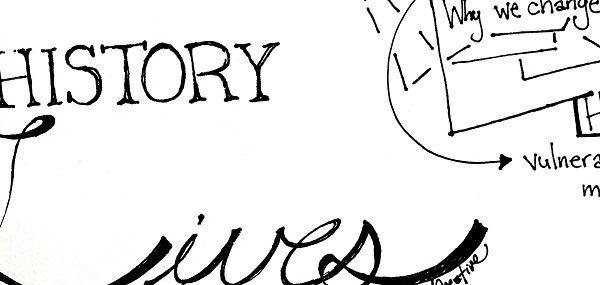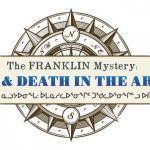
By Kelly MacKay and Andrea Kerr
The following is an abridged version of a blog post originally from The Beast, June 16, 2018 https://thebeastedu.com/2018/06/16/history-lives/
SketchSketchnote by @andCreative
When it is the dark days of data analysis and you are in a basement room at the board office for days on end and an old friend invites you to listen and watch her students live history, you go. You never once pretend the data means more and you go.
Grade 10 history, at a small local high school in Prince Edward County changed me. I went, I watched, I listened and I rubbed elbows with living history, history as it was being uncovered and history as it was being lived and breathed by students who are supposed to understand very little of the purpose of history. As it happens they are the only way it will evolve and become what it should…their culture and identity and who they will know to be their predecessors, change makers, innovators and glass ceiling breakers. At 15 they hold what is dear to many and do it with reverence and grace. Yes, you drop everything as an educator and you run towards this.
There is a little red scooter in the foyer of the high school. The riding kind with a little flag so everyone will see the scooter and the driver. The driver, as it turns out, is 97. He is George Wright, a member of the World War 2 Devil’s Brigade. He has come to watch one of the videos that a grade 10 history class has made as a result of their research, their finding of storytellers and their deep desire to tell the whole story of their small but mighty county. I sit at the back. The front row in the library is lined with guests and the rows that follow are the student videographers. They have told incredible stories as historians uncovering the deepest stories of Prince Edward County. They have done it with a mentor historian and they have done with incredible respect. The history of Prince Edward County Lives.
George Wright from http://www.countylive.ca/pictons-george-wright-receives-minister-of-national-defence-award-of-excellence/ Receiving his 2013 Ministers Award from the Minister of Veterans Affairs, Steven Blaney. Photo by Corporal William White CFSU(O) Photo Services ©2013 DND-MDN, CANADA
After all of the videos were watched and thank yous shared, I muscled my way to the front. A dear friend, a retired vice principal, was standing with the community mentor the student had worked with. They were speaking of a plot of land. It had no road access and was literally plopped in the middle of other land. My friend shared the story of buying the land from the mentor’s family. There was evidence of people living there long ago. This story was about the little plot of land and its rich sugar bush. That sugar bush had been tapped for generations and was incredibly special. These two men spoke about it and relived its history because it was their history.
I was listening so intently to this history that when I looked around the students had gone for lunch. I wasn’t finished. I need to understand more and I needed to know why we hated to let history go and I also wanted to understand the motivation behind a 15-year-old wanting to listen to 90 years old who were hard of hearing and had never played a game of Fortnite. They were telling us something. My friend is their teacher. I asked if I could have a few minutes in a google hangout with two of her students and like she always does, she made sure we followed up, got organized and made space for me to talk to two of her students.
Andrea and I have to spiral back to stories over and over. We cannot let them go. We listen to them deeply. I have come to understand that I listen because I want to know the person telling the story and I know it will be woven in and the person telling you the story is telling you the story to put it out in to the world to be part of who they are out loud. I wanted to know if students listening to history to being told to them by the people who lived it felt the same way.
We found a sliver of time in their busy day and a Google Hangout worked perfectly – with headphones in and lockers perfectly framing their heads they graciously shared and I asked and they shared some more. As it turns out, history makers and history learners feel the same way about stories and the history was living out loud for everyone to be changed by it, including the people who had already lived it.
I asked these two students about interviewing George. It was important to speak loudly and to just take their time because George struggled to hear them. George shared stories with them. His stories, his reasons for joining the Devil’s Brigade was a story of his life and his boredom and his belief that if his father could do it so could he. I wondered if that sounded familiar to two adolescents growing up in tiny Prince Edward County. I did not interrupt their story. They were intrigued by George and his adventures. There are very few men alive who were in the Devil’s Brigade and are able to tell the story. George would show them a medal or remember something and right away tell another story. I realize that he had told these stories many times but I wondered if it felt different this time. I wondered if he was looking at these two young men in front of him filming him and trying to make sense of history and if this took him to a place where he once stood in his own story. Was there a reason to relive history?
I watched their faces as they told me about the project, the interviews, the film editing and watching their peers’ videos as well. I asked if they felt differently about Prince Edward County now that they had heard different voices and different stories.
“Prince Edward County has become a tourist trap, the fact that Lakeshore Lodge, the canning industry and the railroad gave us a better understanding about it before today.”
“It was important to remember what made us come to be, different traditions and history.”
“It meant something different after the project, today I am from the county.”
I wanted to know how they knew if they had done a good a job. They told me about the process and spoke of the many places they self-assessed and dug deeper and edited more and that project was about really getting the facts and doing the research. They had put their guts into it and it felt good. They also told me that they knew by the people who had come the day I had attended. The library had been very quiet while people watched. He was sure that the videos had impacted people who did not know these stories about Prince Edward County and he also knew that the history was personal because it was about where the people in the room actually lived.
I finally asked them about the title of the project, History Lives. They explained that it meant that the history was living on in them because they were telling the stories and not letting them fade away.
Kelly MacKay and Andrea Kerr are eductators in Prince Edward County in Ontario. They write The Beast.


